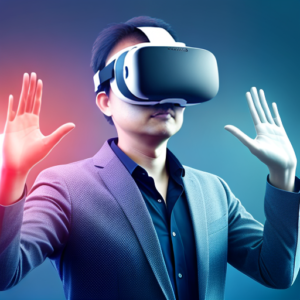Marketing in the Age of Emerging Technologies is bringing about some of the most exciting changes yet. With the rise of artificial intelligence, augmented reality, and virtual reality, businesses are presented with opportunities to revolutionize the way they reach and engage with customers.
These technologies have the potential to change the game entirely, allowing marketers to create more personalized, immersive experiences that capture the attention of consumers like never before. From AI-powered chatbots to AR-enhanced product demos, the possibilities are endless.
As a highly skilled assistant specializing in digital marketing, I understand the importance of staying ahead of the curve and utilizing the latest tools and techniques to drive results.
In this article, we’ll explore how AI, AR, and VR are transforming the marketing landscape and what businesses can do to leverage these emerging Marketing in the Age of Emerging Technologies to their advantage.
Understanding AI (Artificial Intelligence) in Marketing in the Age of Emerging Technologies
Artificial Intelligence (AI) is the simulation of human intelligence processes by computer systems. AI is a powerful tool that can help businesses automate repetitive tasks, analyze large amounts of data, and provide personalized experiences to customers. In marketing, AI can be used to analyze customer behavior, predict customer preferences, and optimize marketing campaigns.
One of the benefits of using AI in marketing is that it can help businesses save time and money by automating tasks that would otherwise require human intervention. For example, AI-powered chatbots can handle customer inquiries and provide personalized recommendations, freeing up human agents to focus on more complex tasks.
Real-life examples of AI in marketing include Amazon’s recommendation engine, which uses AI to personalize product recommendations for each customer based on their browsing and purchase history. Another example is the AI-powered marketing platform, Persado, which uses natural language processing to analyze customer responses and optimize marketing messages for maximum impact.
Related Topic : Maximizing ROI: The Power of Data-Driven Performance Marketing Strategies
Understanding Augmented Reality in Marketing
Augmented Reality (AR) is a technology that overlays digital information onto the real world. AR can be used to enhance product demos, provide interactive experiences, and create immersive brand experiences. AR is becoming increasingly popular in marketing, as it allows businesses to create unique, engaging experiences that capture the attention of consumers.
One of the benefits of using AR in marketing is that it can help businesses showcase their products in a more interactive and engaging way. For example, IKEA’s AR app allows customers to visualize furniture in their own homes before making a purchase, enhancing the customer experience and reducing the risk of returns.
Real-life examples of AR in marketing include the AR-enhanced Pepsi Max bus shelter campaign, which used AR to create an interactive experience for consumers waiting at bus stops. Another example is the AR-powered makeup try-on feature in Sephora’s app, which allows customers to see how different makeup products will look on their face before making a purchase.
Understanding Virtual Reality in Marketing
Virtual Reality (VR) is a technology that creates a completely immersive digital environment. VR can be used to create interactive brand experiences, provide virtual product demos, and transport customers to new locations. VR is still a relatively new technology, but it is quickly gaining popularity in marketing as businesses look for new ways to create unforgettable experiences for their customers.
One of the benefits of using VR in marketing is that it can help businesses create immersive experiences that capture the attention of consumers. For example, the North Face’s VR experience allows customers to explore Yosemite National Park and try on North Face products in a virtual environment, creating a memorable and unique experience.
Real-life examples of VR in marketing include the VR-powered Mercedes-Benz campaign, which allowed customers to experience the new Mercedes-Benz GLC in a virtual environment before it was released. Another example is the VR-powered Toms Shoes campaign, which allowed customers to experience the impact of their purchase by virtually visiting a community in need.
How Emerging Technologies Will Change the Marketing Game

Emerging technologies like AI, AR, and VR have the potential to transform the marketing landscape in a number of ways. These technologies allow businesses to create more personalized, immersive experiences that capture the attention of consumers and drive results. Here are some of the ways that emerging technologies will change the marketing game:
- Personalization: AI can be used to analyze customer behavior and provide personalized recommendations, while AR and VR can be used to create immersive experiences tailored to each customer’s preferences.
- Engagement: AR and VR can be used to create interactive experiences that capture the attention of consumers and keep them engaged with a brand.
- Brand Awareness: Emerging technologies can be used to create memorable brand experiences that leave a lasting impression on customers.
- Data Analysis: AI can be used to analyze large amounts of data, providing businesses with insights that can be used to optimize marketing campaigns and improve ROI.
Preparing for the Future of Marketing
As emerging technologies continue to gain popularity in marketing, it’s important for businesses to prepare for the future by investing in these technologies and staying up-to-date with the latest trends. Here are some steps that businesses can take to prepare for the future of marketing:
- Invest in AI: Businesses should consider investing in AI-powered marketing tools and platforms to automate tasks and provide personalized experiences to customers.
- Experiment with AR and VR: Businesses can experiment with AR and VR to create unique and engaging experiences that capture the attention of consumers.
- Stay Up-to-Date: Businesses should stay up-to-date with the latest trends and technologies in marketing to stay ahead of the competition.
Challenges and Limitations of Using Emerging Technologies in Marketing
While emerging technologies like AI, AR, and VR offer many benefits to businesses, there are also challenges and limitations that must be considered. These technologies are still relatively new and may require significant investments of time and money to implement effectively. Additionally, there may be privacy and security concerns related to the collection and use of consumer data.
Conclusion
The rise of Marketing in the Age of Emerging Technologies like AI, AR, and VR is changing the marketing game and presenting businesses with new opportunities to create personalized, immersive experiences for customers.
While these technologies may present challenges and limitations, businesses that invest in them and stay up-to-date with the latest trends will be poised for success in the future of marketing.
Administrator
Digital Pranav



